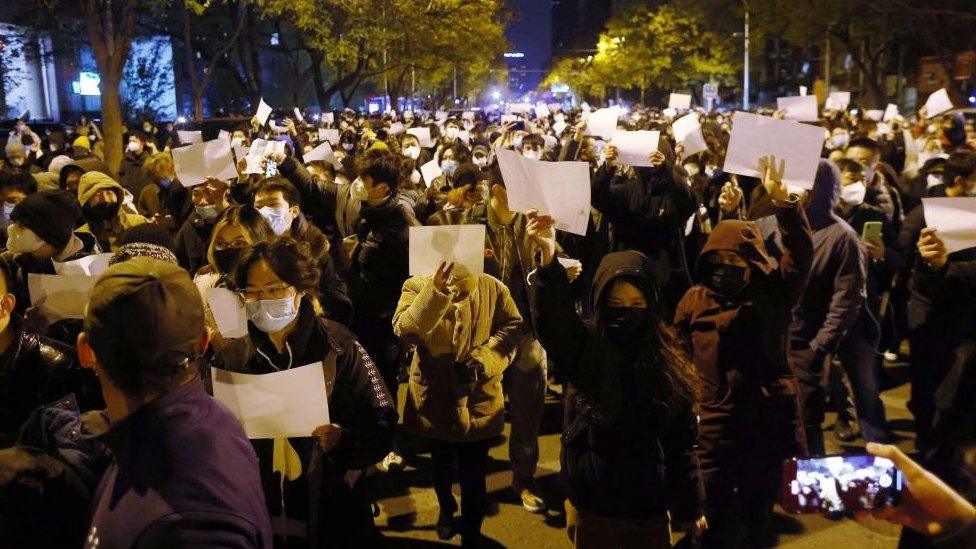China Covid: Chinese protesters say police seeking them out
- Published
WATCH: Five dramatic days in China as protesters take to the streets
People in China who attended weekend protests against Covid restrictions say they have been contacted by police, as authorities begin clamping down.
Several people in Beijing said police had called demanding information about their whereabouts.
It is unclear how police might have discovered their identities.
On Tuesday officials renewed a promise to speed up efforts to vaccinate older people. Vaccination rates among elderly people are relatively low.
China has recorded record numbers of new cases in recent days.
Over the weekend, thousands in China took to the streets demanding an end to Covid lockdowns - with some even making rare calls for President Xi Jinping to stand down.
But on Monday, planned protests in Beijing did not happen after officers surrounded the assembly point. In Shanghai, large barriers were erected along the main protest route and police made several arrests.
The demonstrations began after a fire in a high-rise block in Urumqi, western China, killed 10 people on Thursday. Many Chinese believe Covid restrictions contributed to the deaths, although the authorities deny this.
Asked whether the protests would prompt a change to zero-Covid rules, an official said China would continue to "fine tune and modify" its measures.
"We are going to maintain and control the negative impact to people's livelihoods and lives," said Mi Feng, a National Health Commission spokesman, at a press conference.
On Tuesday morning, police could be seen in both Beijing and Shanghai patrolling areas where some groups on the Telegram messaging app had suggested people should gather again.
A small protest in the southern city of Hangzhou on Monday night was also quickly stopped with people swiftly arrested, according to social media footage verified by the BBC.
Reports also say that police were stopping people and searching their phones to check if they had virtual private networks (VPNs) set up, as well as apps such as Telegram and Twitter which are blocked in China.
One woman told news agency AFP that she and five of her friends who attended a protest in Beijing had received phone calls from police.
In one case, a police officer visited her friend's home after they failed to answer their phone and asked whether they had visited the protest site, stressing that it was an "illegal assembly".
Another told Reuters that they were asked to show up at a police station to deliver a written record of their activities on Sunday night.
"We are all desperately deleting our chat history," one Beijing protester told Reuters. "Police came to check the ID of one of my friends and then took her away. A few hours later they released her."
Police have also detained journalists covering the protests in recent days. News agency Reuters said one of its journalists was briefly detained on Sunday before being released.
BBC journalist Ed Lawrence was also held for several hours while covering a protest in Shanghai on the same night. UK Prime Minister Rishi Sunak said his detention was "shocking and unacceptable", adding that Britain would raise concerns with China about its response to the protests.
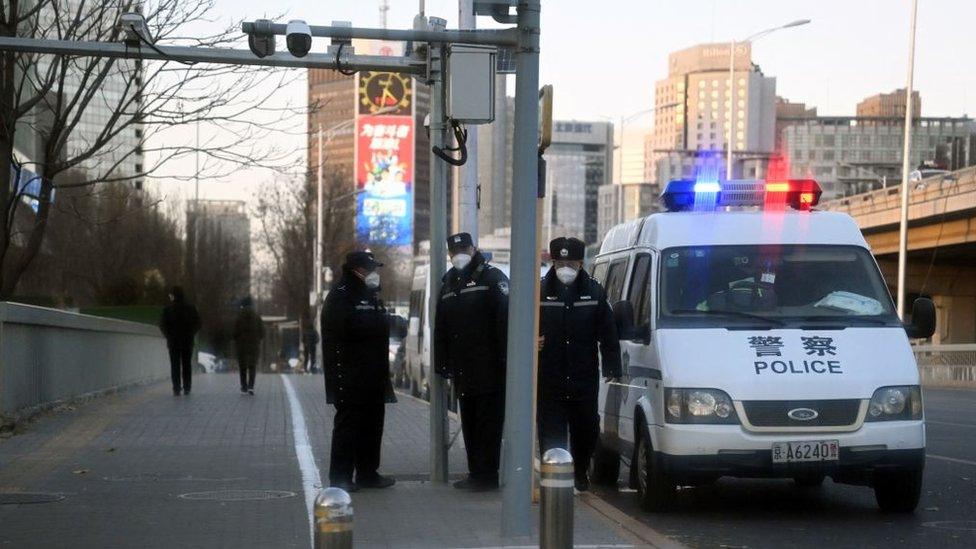
Police by the Liangma river bridge in Beijing on Tuesday - the location of a protest over the weekend
But overseas Chinese have continued protesting, in at least a dozen cities across the world.
Many also gathered outside Chinese embassies in major cities around the world like London, Paris and Tokyo, and universities in the US and Europe.
One expert suggested that local protests were not likely to die down any time soon, saying they were likely to "ebb and flow" because people were "not being called out to the streets in a controlled fashion... they move between social media and the street".
But Drew Thompson, a visiting senior research fellow at the National University of Singapore, added that it was also important to note that Chinese police had "tremendous capacity... [and] the ability of China to control these protests going forward... is quite high".
Censorship has gone into overdrive on Chinese social media platforms since the weekend's protests, to stop people seeing and discussing them.
Tens of millions of posts have been filtered from search results, while media are muting their coverage of Covid in favour of upbeat stories about the World Cup and China's space achievements.
It's a vastly different scene on Western social media platforms, which some Chinese people have taken to to share information including advice for protesters to avoid arrest.
One account on Instagram - a platform which is blocked in China and accessible only through a VPN - published a "safety guide for friends in Shanghai and across the country" and included tips like wearing dark coloured clothing for anonymity and bringing along goggles and water in the event that tear gas is fired.
Adhering to a zero-Covid policy
Chinese officials have implied that complaints over China's tough Covid curbs were a result of "arbitrary measures" rolled out at a local level, rather than as a result of national guidelines.
"[There is an] over practice of containment measures [in some localities]... that is not aligned to national policies," said Cheng You Quan of the National Disease Control and Prevention Administration at Tuesday's press conference.
"Local governments should show more responsibility and follow national guidelines, [instead of following practices like] arbitrarily stopping schools and industry. We should name and shame as well as pursue criminal responsibility if necessary. Lockdowns should be quick and the removal of lockdowns should be equally quick."
China remains the only major economy with a strict zero-Covid policy, with local authorities clamping down on even small outbreaks with mass testing, quarantines and snap lockdowns.
While China developed its own Covid vaccines, they are not as good as the mRNA technology - such as the Pfizer and Moderna shots - used elsewhere.
Two doses of the Pfizer/BioNTech vaccine gives 90% protection against severe disease or death versus 70% with China's Sinovac.
The vaccines have also not been given to enough people. Far too few of the elderly - who are most likely to die from Covid - have been immunised.
There is also very little "natural immunity" from people surviving infections as a consequence of stopping the virus in its tracks.
It means new variants spread far more quickly than the virus that emerged three years ago and there is a constant risk of it being imported from countries that are letting the virus spread.
Related topics
- Published28 November 2022
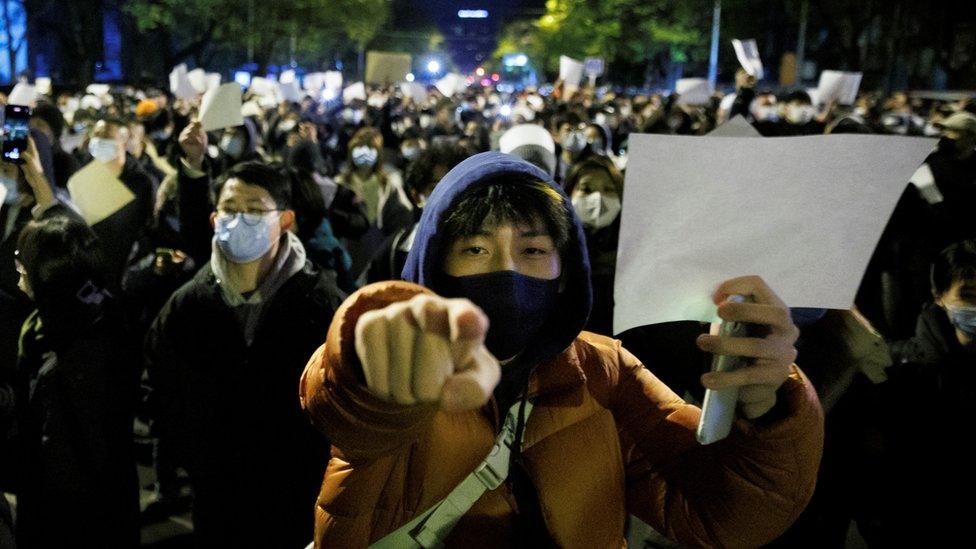
- Published28 November 2022
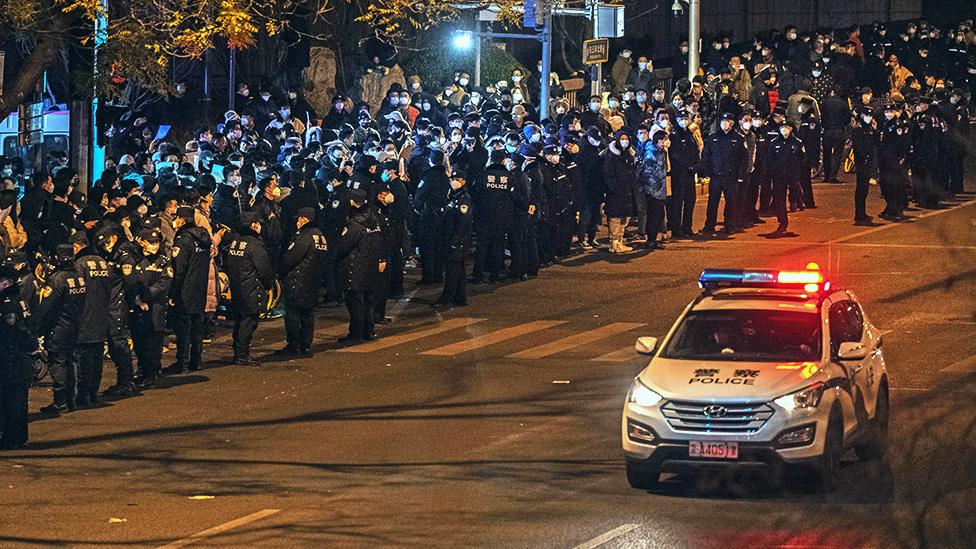
- Published28 November 2022
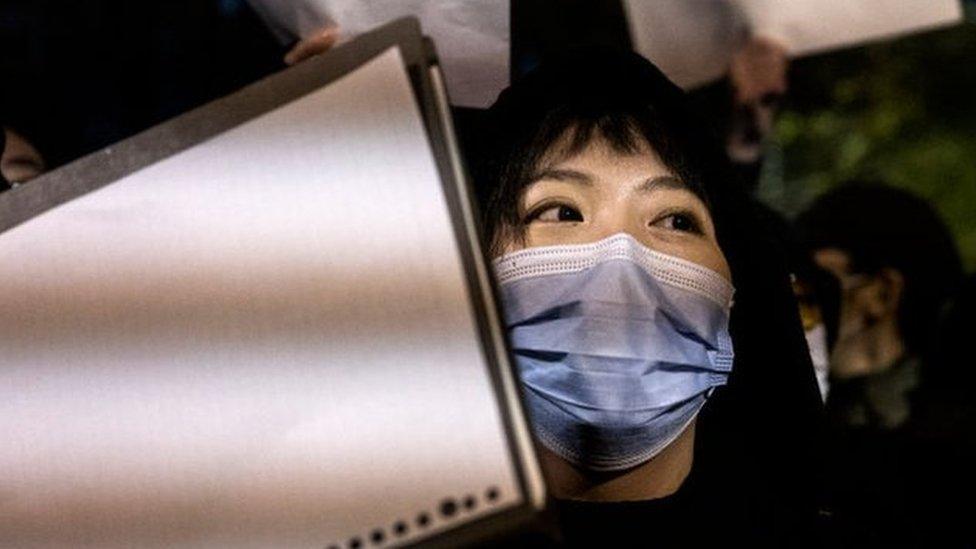
- Published27 November 2022
